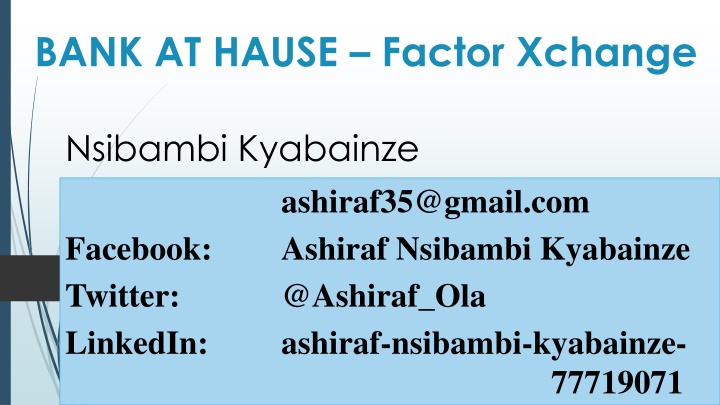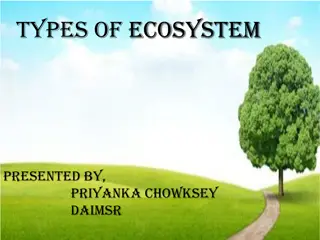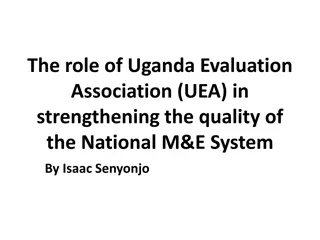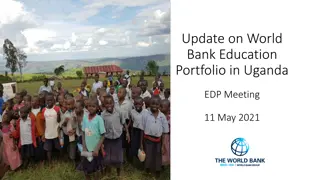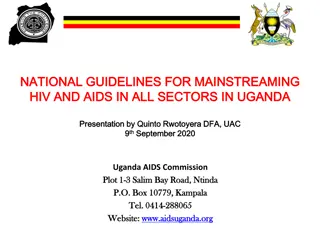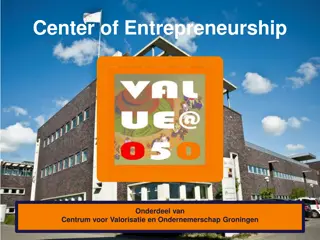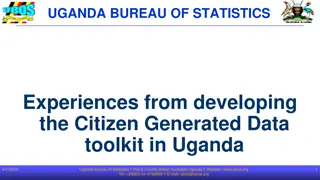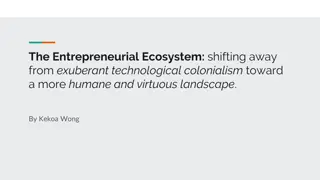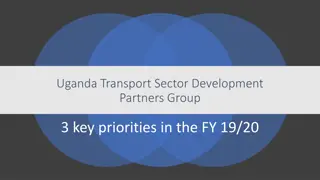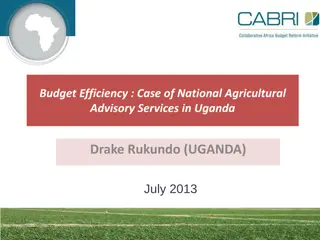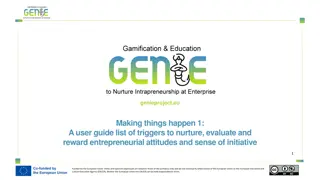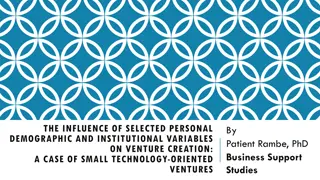Enhancing Entrepreneurial Ecosystem in Uganda: A Solution-Oriented Approach
An exploration of the challenges faced by Ugandan entrepreneurs due to limited access to resources and skills, and a proposed solution through a peer-to-peer exchange platform named BANK.AT.HAUSE Factor Xchange. The platform aims to facilitate the exchange of factors of production such as capital, land, labor, and entrepreneurship, thereby fostering economic decision-making and improving factor payments. The entrepreneurial ecosystem in Uganda, characterized by abundant but underutilized entrepreneurial potential, necessitates initiatives to support and enhance the quality of entrepreneurship for sustainable growth.
Download Presentation

Please find below an Image/Link to download the presentation.
The content on the website is provided AS IS for your information and personal use only. It may not be sold, licensed, or shared on other websites without obtaining consent from the author.If you encounter any issues during the download, it is possible that the publisher has removed the file from their server.
You are allowed to download the files provided on this website for personal or commercial use, subject to the condition that they are used lawfully. All files are the property of their respective owners.
The content on the website is provided AS IS for your information and personal use only. It may not be sold, licensed, or shared on other websites without obtaining consent from the author.
E N D
Presentation Transcript
BANK AT HAUSE Factor Xchange Nsibambi Kyabainze ashiraf35@gmail.com Facebook: Ashiraf Nsibambi Kyabainze Twitter: @Ashiraf_Ola LinkedIn: ashiraf-nsibambi-kyabainze- 77719071
WHAT HOW WHY An exchange of factors of production. (e.g capital, land, labor and entrepreneurship) Limited access to factor inputs such as entrepreneurial skills, Finance/Start-up capital, profitable business locations and Affordable skilled labor. Peer to Peer approach. Integrating socio- economic data about factors of production and sharing it with users to help them make economic decision. in return for rewards known as factor payments. (e.g interest, rent, wage/salary, profit ) This has stalled many promising business ideas. One platform
PROBLEM : Case of Uganda Uganda ranked as the country with the highest level of entrepreneurship in the world by GEM (Global Entrepreneurship Monitor). Resources necessary to grow a business such as finance, human and social capital and infrastructure are less accessible. Making it difficult to earn better factor payments including; Wages paid for the services of labor. Interest paid for the services of capital. Rent paid for the services of land/business location. And Profit paid for services of entrepreneurship. 28.1% of the population are micro-entrepreneurs: these are business-people who employ fewer than five individuals often family members under informal arrangements. These smaller firms are more likely to fail, due to the high levels of uncertainty and risk in their local environments.
ENTREPRENEURIAL ECOSYSTEM IN UGANDA 2.32 3.39 2.74 3.34 2.2 2.84 2.54 2.42 3.53 3.11 3.03 2.21
REFERENCE http://www.gemconsortium.org/country-profile/117 An abundance of willing entrepreneurs held back by limited skills. Support from the government is building. CHALLENGES FOR THE FUTURE The number one challenge is to ensure the growth and survival of entrepreneurial ventures. GEM shows that only 2% of businesses expect to employ 20+ people in the next five years, implying that Ugandan entrepreneurship is concentrated in small and micro businesses. Moreover, there is a high business discontinuation rate (21%). It is time to create initiatives that both support and improve the quality of entrepreneurship in Uganda.
SOLUTION Data Mining Business Space Finance Socio- economic Data Profitable business Land / Location Social capital Rent Data about properties to expand, Interest, BANK AT HAUSE Factor Xchange Data about stock markets, regulations, financial policies. Profits , Data about market prices, new markets Wages, Data about training centers, workshops application Cheap/ affordable Skilled Labor Entrepreneur Products/ Services Response Skills Query Database
BUSINESS MODEL KEY PARTNERS KEY ACTIVITIES VALUE PROPOSITION - Integration of economic Data about factors to aid decision making. - Access to factor inputs - Business growth CUSTOMER RELATIONSHIPS - News letters - Notifications - Safe & instant transactions CUSTOMER SEGMENTS Money Lenders Peers Entrepreneurs Landlords Skilled Workers REVENUE STREAMS SDK Finance Swarm Vision - Idea testing. - Market Testing - Product design. - Collaboration. COST STRUCTURES USD 50,000 for - Product - Operations - Equipment - Internet - Marketing - Scalability KEY RESOURCES - Developers - Human resource - Workspace - Internet - Start up capital CHANNELS - Web - Mobile - Social Media - Adverts - Campaigns - Meetups - Factor Payments - Peer Trust - Adverts - Household income rise
TEAM NSIBAMBI KYABAINZE AKOLA TEDDY LUKANGA HAKIM NANJERU MARIAM Team Lead Finance Product Development Business Development
TIMELINE STEP 2 STEP 3 STEP 4 STEP 1 Market Opportunity Analysis Approach Partners Raise Capital Platform Development Web Mobile Internet of Things Device for management app We are here business
COLLABORATION : Product Developers, Financial support, Direct pass to a Grant, Infrastructure, Resources, Workspace, Technical Support, Mentorship, Links to investors, Business Developers. Please contact me: ashiraf35@gmail.com Facebook: vertabra Twitter: @Ashiraf_Ola LinkedIn: ashiraf-nsibambi-kyabainze
